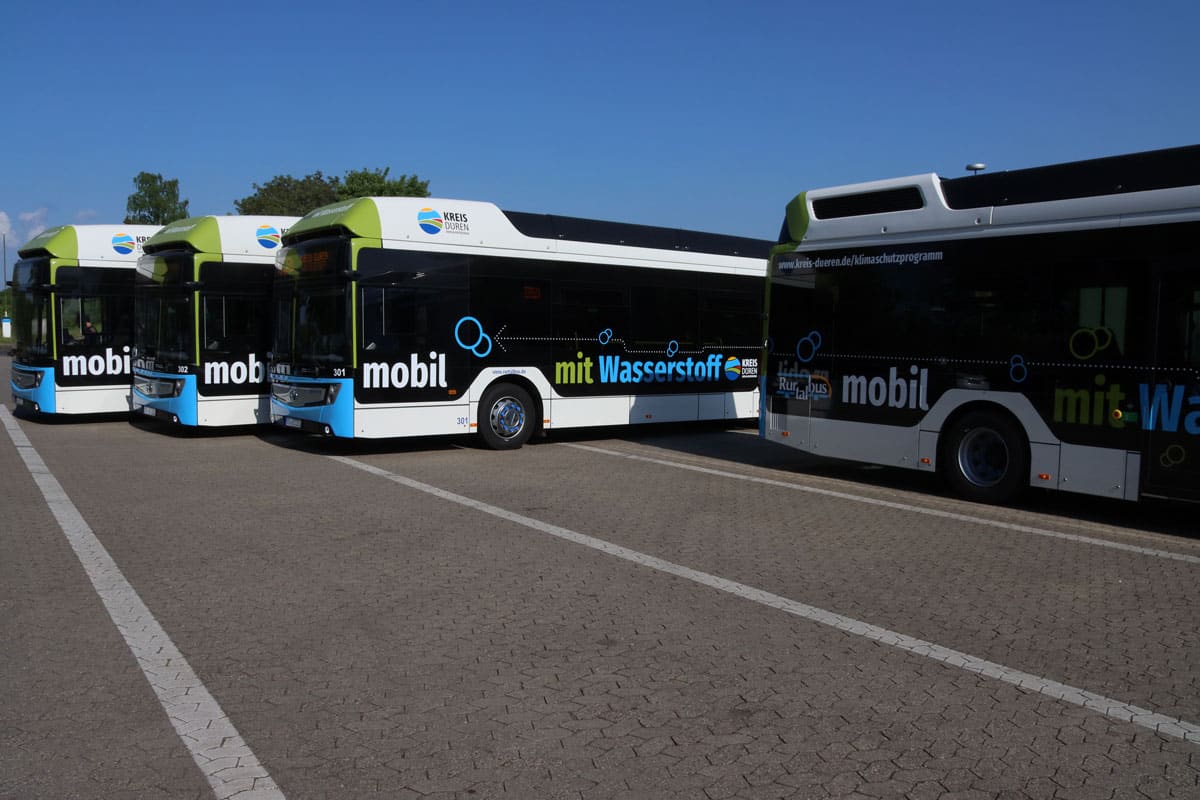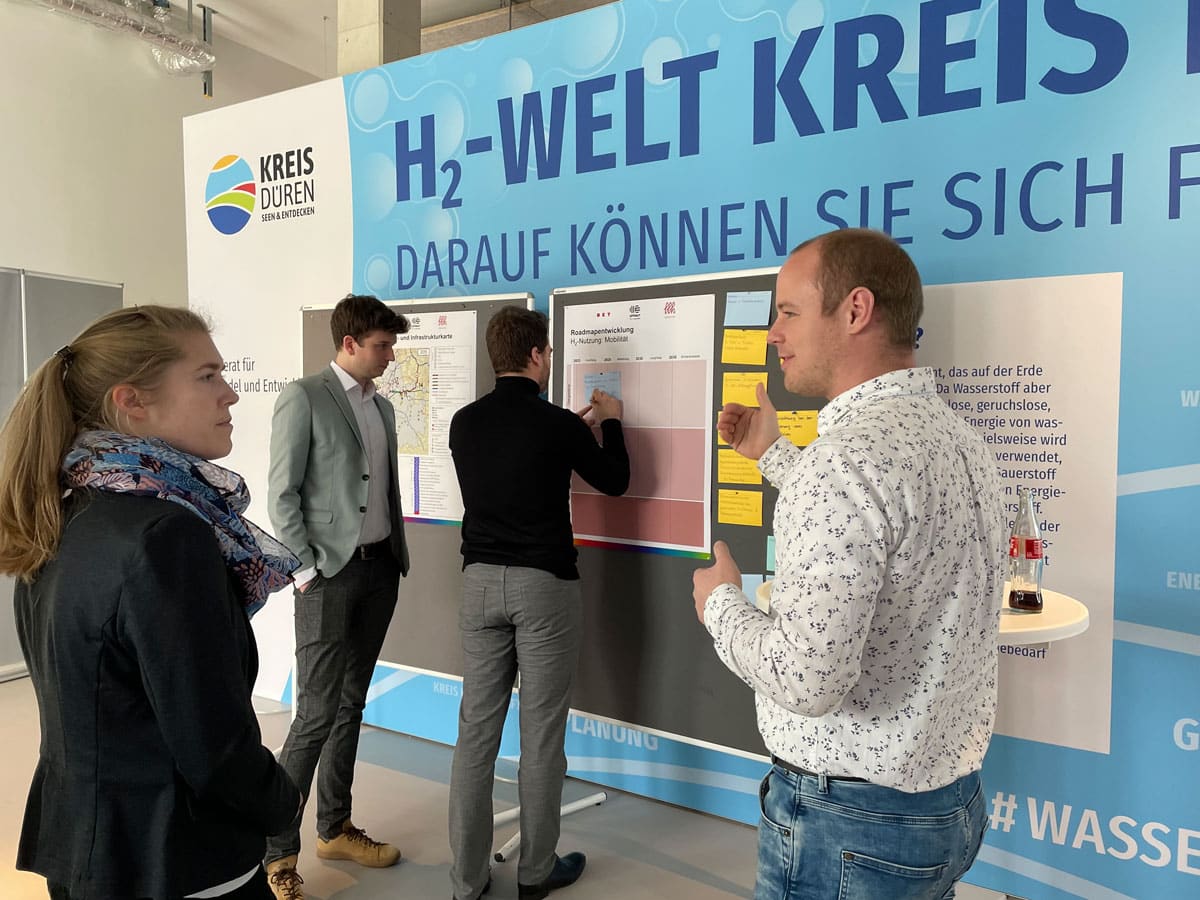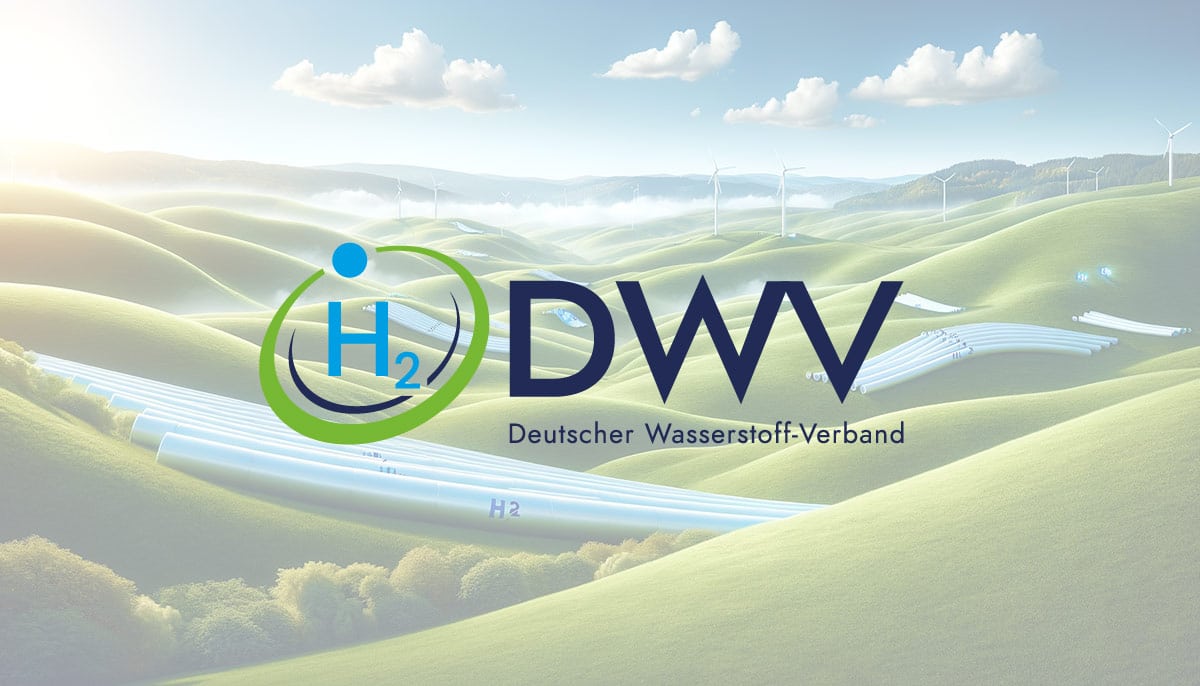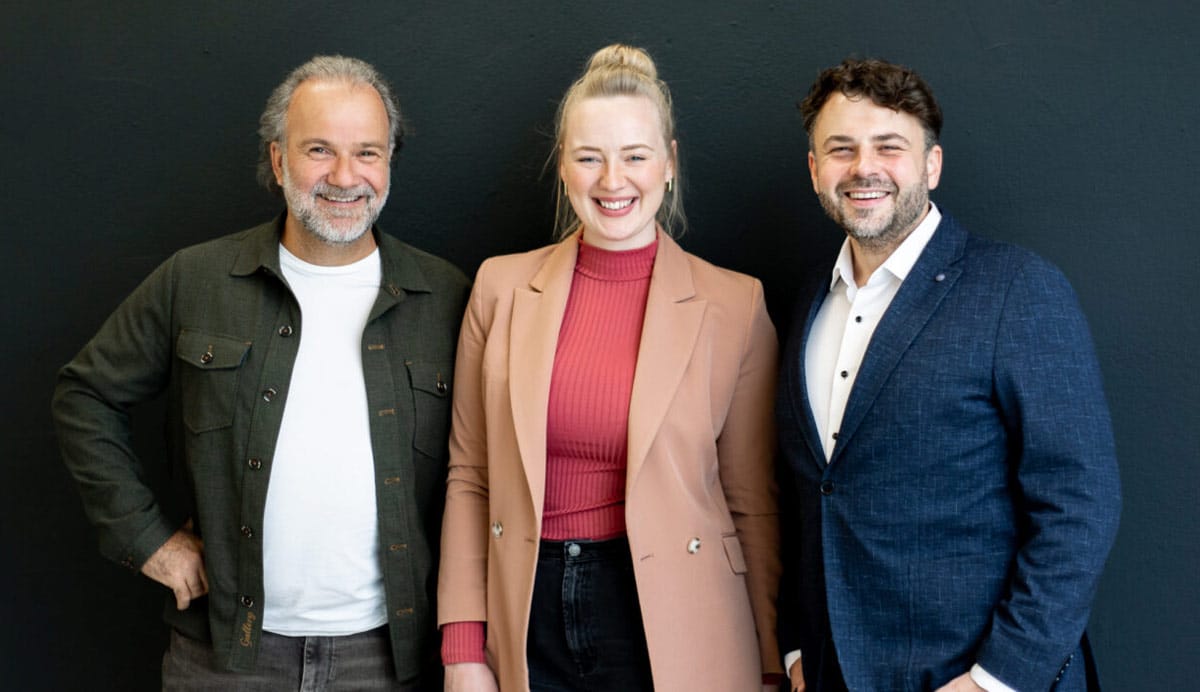Hydrogen Regions series: HyExpert region AachenPLUS
The HyExpert region of AachenPLUS in Germany is facing up to the challenge of how to manage the long-term restructuring necessitated by the phaseout of brown coal. The plan is to use the emerging hydrogen economy as a means to keep value in the region, create a sustainable energy supply and facilitate a transition to cleaner modes of transport. The focus is on exchanging ideas and linking up different hydrogen projects so that the experience gained can be swiftly put to use in the region.
It’s all happening in the west! Be it in mid-sized industrial enterprises, local public transport, local rail networks, neighborhood schemes or research initiatives, new hydrogen projects abound in the southwest of Nordrhein-Westfalen between the Rhine area in the east and the border with Belgium and the Netherlands in the west. The HyExpert region of AachenPLUS encompasses the city and the wider Aachen area, the districts of Düren, Euskirchen and Heinsberg, and the town of Kerpen and has all the right ingredients to build a strong and sustainable hydrogen economy. The large number of regional stakeholders also means that there is a vast array of different needs and approaches.
The region has excellent research capabilities thanks to RWTH Aachen University, FH Aachen University of Applied Sciences and the FZ Jülich research center all being situated here. At the same time, there is also an innovative and agile base of medium-sized industrial companies which covers virtually the entire hydrogen value chain from green power generation to hydrogen production and storage through end use. In addition, participating regional bodies are using hydrogen to develop their local public transport into carbon-neutral networks.
Kickoff in May 2021
The aim of the HyExpert project was to develop a strategy for how the region could use the various approaches to successfully ramp up the hydrogen economy. Since the region, which is home to the Garzweiler, Hambach and Inden brown coal opencast mines, is an area undergoing structural change, the issue of retaining and creating value here is also of high importance. Even before the project started, it was recognized that it would be beneficial for activities to be coordinated at a regional level. For this purpose, the Hydrogen Hub Aachen was founded in May 2021.
As part of this initiative, a project office, sited at the Aachen Chamber of Industry and Commerce, is responsible for coordinating regional hydrogen schemes in the districts of Düren, Euskirchen and Heinsberg as well as in the city and metropolitan area of Aachen. Its work is supported by the Aachen society for innovation and technology transfer AGIT.
A look ahead to a future hydrogen supply makes it clear that a combination of different supply pathways is necessary for successful market ramp-up in the AachenPLUS region. For an inland area, the AachenPLUS region offers good potential for the expansion of renewable energy in the form of wind and photovoltaics. The Heinsberg district, for example, is currently extending its own green electricity portfolio in order to create local electrolyzer capacity in the near future. An initial electrolyzer site is already being instigated in Heinsberg-Oberbruch. Other sites for decentralized power generation should follow.
Hydrogen pipelines: a lifeline
Despite this potential, the energy-intensive mid-size industries and the through traffic on the large autobahns mean that the region remains a hydrogen “sink” that is unable to meet its hydrogen needs from its own production. Consequently, the region must rely on imported hydrogen in addition to local production. Here, its position on the border with Belgium and the Netherlands gives proximity to their ports, thus creating an added advantage: Plans for a core hydrogen network envisage the building of a hydrogen pipeline that will pass across the region from west to east, starting from the border crossing point at Eynatten in Belgium. According to Thyssengas, proposals exist to convert the Weisweiler-Düren line to hydrogen from 2027 onward.
In addition to the highly likely connection to the planned hydrogen backbone, the Delta Rhine Corridor offers another option for supplying the AachenPLUS region with hydrogen. While plans to date foresee the construction of this pipeline only as far as the Dutch town of Sittard, it will be down to the region to campaign for a continuation of this pipeline infrastructure. In this regard, it will be important for the region to create appropriate exit points for the supply of local consumers and to expand cross-border activities.
Many individual projects
The opportunities offered by the connection to the core hydrogen network should not, however, distract focus from local and decentralized solutions, of which there are many different approaches in the region: At the Brainergy Park in Jülich, a solar farm is being built that will include an electrolyzer for the purposes of supplying future fuel cell trains in the Rurtalbahn network and fuel cell buses operated by Rurtalbus. In Hellenthal, plans are afoot for an electrolyzer project that will serve as electricity storage. In Mechernich, meanwhile, a project is being devised to extract hydrogen from green waste. Back in Aachen, an electrolyzer to supply local public transport operator ASEAG is in the offing and in Herzogenrath the company Saint-Gobain is planning to build electrolyzer capacity in order to supply energy for glass production.
Work is also underway in Kerpen on the Speicherstadt energy storage project and the Mobilitätshafen mobility hub project which together will supply hydrogen to the local public transport network. In Heinsberg, the H2HS project intends to create a complete hydrogen ecosystem. In this case, the hydrogen is expected to supply trade and industry, local public transport, the logistics sector, heavy-duty transport and the housing sector. What’s more, the waste heat from the electrolyzer is to be fed into the local heating network and the oxygen used in a nearby sewage plant.
Other, somewhat surprising, application examples can be found in the region’s heating sector. In Linnich, hydrogen is used to generate heat through a microgrid; in Euskirchen, it acts as a means of seasonal energy storage for a residential area.
All these projects offer solutions that have a valuable part to play in ramping up the hydrogen economy. They enable business cases to be drawn up and allow clarification of unresolved technical issues. Vital experience can also be gathered about approvals procedures and the regulatory framework. Furthermore, these projects can be used to develop long-term solutions for areas with a hydrogen deficit aside from a connection to the backbone.
Essential for the further development of the HyExpert region AachenPLUS will be the ability to harness the knowledge gained from these projects. This is to be organized through the Hydrogen Hub where experiences can be exchanged and knowledge transferred between projects. A matchmaking facility will also be set up to link producers with potential off-takers in order to encourage further projects and ensure the viability of planned projects.
Another area of application is mobility. All local public transport operators in the region have either already procured fuel cell buses or have plans to do so. Additionally, the Düren district will shortly see the operation of fuel cell trains on the Rurtalbahn rail network. Funding letters for these projects were delivered in May 2023 by German transportation minister Wissing. More information on the Düren projects can be found on page 28.
The study that was created as part of the HyExpert project has shown that the conversion of fleets to fuel cell vehicles can also be expected in the logistics sector. To meet the needs of these vehicles, at least 13 hydrogen refueling stations will need to have been installed in the region by 2035. It is therefore envisaged that the working group comprising members of the local public transport and logistics sectors, which was established as part of the HyExpert project, will be continued in order to facilitate targeted and coordinated planning of this infrastructure.
Hunt for skilled staff
An aspect that will have a crucial role to play in bringing projects to fruition will be the securing of skilled staff. These workers will be essential for translating plans into action and capitalizing on research and development capabilities so as to accelerate the local hydrogen economy. With this in mind, efforts by the Hydrogen meet&connect network to encourage interaction between small- and medium-sized businesses and academia need to be stepped up. Information events should be held at schools to ensure there is widespread coverage in terms of education and training. In addition, new specialized training centers and vocational courses must be initiated which will, for instance, provide instruction on the safe handling and transportation of hydrogen as well as on hydrogen heating, fuel cells and hydrogen mobility. As the training of new employees will not in itself be sufficient to fulfill staffing needs, extensive further education schemes should also be coordinated and made available, for example through trade guilds or the chambers of industry and commerce.
Author: Fabian Müller-Lutz, Aachen Chamber of Industry and Commerce, Fabian.Mueller-Lutz@aachen.ihk.de



























0 Comments
Trackbacks/Pingbacks